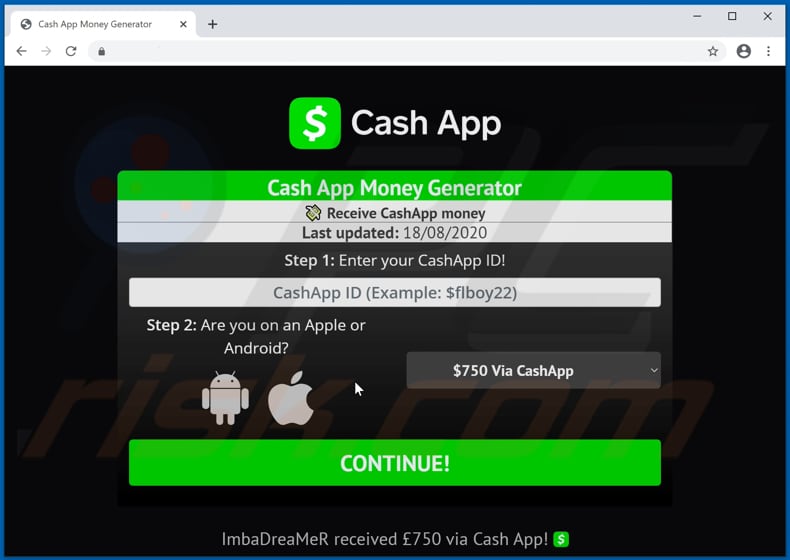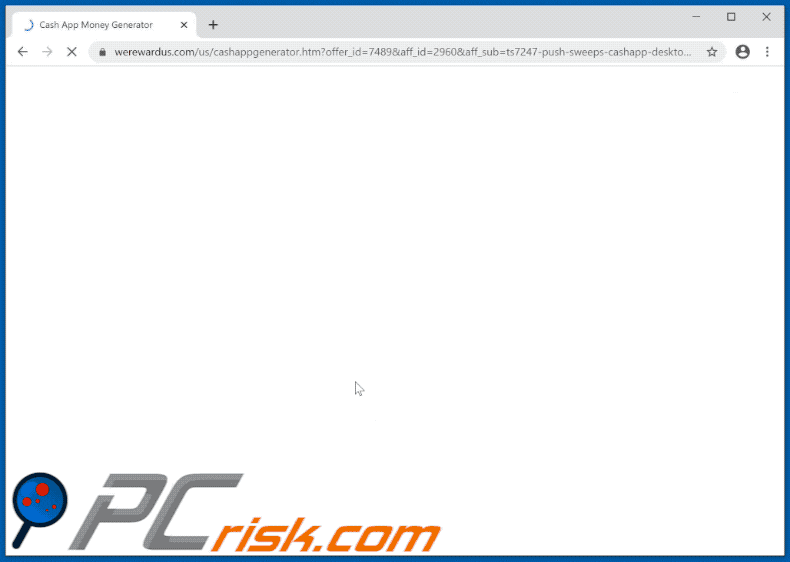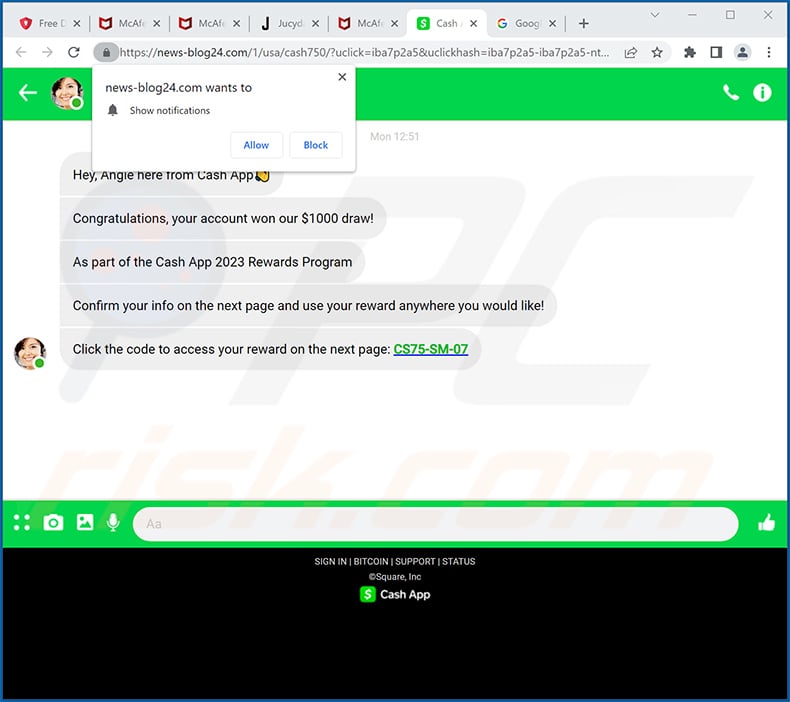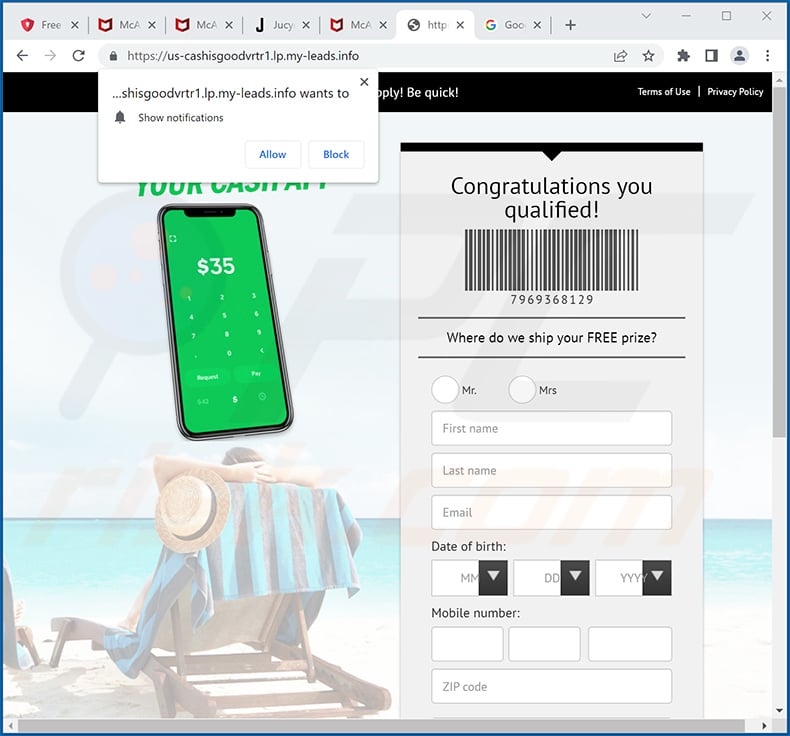How to remove apps promoting the Cash App scam and others
Phishing/ScamAlso Known As: Cash App money generator scam
Get free scan and check if your device is infected.
Remove it nowTo use full-featured product, you have to purchase a license for Combo Cleaner. Seven days free trial available. Combo Cleaner is owned and operated by RCS LT, the parent company of PCRisk.com.
What is Cash App scam?
This scam page is disguised as a Cash App Money Generator, which generates specific sums of money for users free of charge. Note that the genuine Cash App mobile payment service has nothing to do with this phishing scam. The main purpose of scammers behind this web page is to trick visitors into providing sensitive, personal information.
Commonly, these web pages are opened by browsers with unwanted applications installed. Users often arrive at these bogus sites through clicking deceptive ads and/or visiting untrusted web pages.

More about the Cash App scam
Whoever visits this scam website is asked to enter a Cash App ID ($Cashtag) and then follow further instructions to receive a specific sum of money. In fact, after completing all steps, visitors are asked to provide sensitive information.
It is very likely that scammers use this web page to trick unsuspecting Cash App users into providing their login credentials, credit card details, or other information, which can then be misused to steal accounts and identities, make fraudulent purchases and transactions, and for other malicious purposes.
In summary, scammers behind this website attempt to deceive visitors into providing details, which are misused to generate revenue in various ways. As mentioned, the official Cash App website/service has nothing to do with this deceptive site. Therefore, ignore this site and avoid it.
If your browser opens these web pages often, it is very likely a rogue application is installed on the browser and/or operating system.
More about rogue apps promoting scams
Apps of this kind open untrusted pages, gather browsing data, and display unwanted advertisements. They commonly target browsing-related information such as IP addresses, geolocations, entered search queries, addresses of visited pages, etc. They might also collect private, sensitive information.
The data is sold to third parties (potentially, cyber criminals) or misused to generate revenue in other ways. Furthermore, these apps can generate revenue for the developers by serving ads including coupons, banners, surveys, pop-ups, etc. Users often who click these ads arrive at dubious web pages or cause download/installation of unwanted apps.
| Name | Cash App money generator scam |
| Threat Type | Phishing, Scam, Social Engineering, Fraud. |
| Fake Claim | Visitors can receive money via Cash App. |
| Related Domain | werewardus[.]com, news-blog24[.]com |
| Detection Names (werewardus[.]com) | Avira (Phishing), CRDF (Malicious), Emsisoft (Phishing), Kaspersky (Phishing), Full List Of Detections (VirusTotal) |
| Serving IP Address | 91.224.58.42 |
| Symptoms | Fake error messages, fake system warnings, pop-up errors, hoax computer scan. |
| Distribution methods | Compromised websites, rogue online pop-up ads, unwanted applications. |
| Damage | Loss of sensitive private information, monetary loss, identity theft, possible malware infections. |
| Malware Removal (Windows) |
To eliminate possible malware infections, scan your computer with legitimate antivirus software. Our security researchers recommend using Combo Cleaner. Download Combo CleanerTo use full-featured product, you have to purchase a license for Combo Cleaner. 7 days free trial available. Combo Cleaner is owned and operated by RCS LT, the parent company of PCRisk.com. |
Examples of scam sites
More examples of untrustworthy, scam websites are "$1000 Bank of America Gift Card", "Amazon Loyalty Program" and "You've Made The 9.68-Billionth Search". Commonly, these pages attempt to trick visitors into believing that they can win a prize or money and/or receive something else free of charge, if they provide certain information.
Generally, they are asked for personal, sensitive information and will receive nothing in return.
How did unwanted applications install on my computer?
Rogue apps are commonly distributed by integrating them into the download and/or installation set-ups of other programs, so that a proportion of users inadvertently download and install them together with their chosen software. This distribution method is known as "bundling".
Offers to download and install additionally-included apps usually appear in "Advanced", "Custom" and other settings of the set-ups (where they can usually be declined). Many users fail to check and change these settings, thereby granting permission for shady apps to be downloaded and installed by default.
In addition, unwanted downloads and installations are sometimes caused by clicking deceptive advertisements capable of executing certain scripts.
How to avoid installation of unwanted applications
Download software and files from official websites and via direct links. It is not safe to use torrent clients, eMule (or other Peer-to-Peer networks), third party downloaders, unofficial websites or other sources of this kind. Avoid third party installers. Check "Advanced", "Custom" and other settings, and decline offers to download or install unwanted software.
Do not click ads that are displayed on dubious websites, since they can open other untrusted websites or even cause unwanted downloads and installations. Remove any unwanted, suspicious applications (extensions, add-ons, and plug-ins) that are installed on the browser.
The same should be applied to programs of this kind that are installed on the operating system. If your computer is already infected with rogue apps, we recommend running a scan with Combo Cleaner Antivirus for Windows to automatically eliminate them.
The appearance of Cash App pop-up scam (GIF):

Text presented in Cash App scam website:
Cash App Money Generator
Receive CashApp money
Last updated: 18/08/2020
Step 1: Enter your CashApp ID!
CashApp ID (Example: $flboy22)
Step 2: Are you on an Apple or Android?
$750 Via CashApp
GusTn received £750 via Cash App!
Another variant of a Cash App-themed scam website promoting a phishing site:

Text presented within:
Hey, Angie here from Cash App
Congratulations, your account won our $1000 draw!
As part of the Cash App 2023 Rewards Program
Confirm your info on the next page and use your reward anywhere you would like!
Click the code to access your reward on the next page: CS75-SM-07
Screenshot of the phishing site users get redirected to:

Instant automatic malware removal:
Manual threat removal might be a lengthy and complicated process that requires advanced IT skills. Combo Cleaner is a professional automatic malware removal tool that is recommended to get rid of malware. Download it by clicking the button below:
DOWNLOAD Combo CleanerBy downloading any software listed on this website you agree to our Privacy Policy and Terms of Use. To use full-featured product, you have to purchase a license for Combo Cleaner. 7 days free trial available. Combo Cleaner is owned and operated by RCS LT, the parent company of PCRisk.com.
Quick menu:
- What is Cash App money generator scam?
- How to identify a pop-up scam?
- How do pop-up scams work?
- How to remove fake pop-ups?
- How to prevent fake pop-ups?
- What to do if you fell for a pop-up scam?
How to identify a pop-up scam?
Pop-up windows with various fake messages are a common type of lures cybercriminals use. They collect sensitive personal data, trick Internet users into calling fake tech support numbers, subscribe to useless online services, invest in shady cryptocurrency schemes, etc.
While in the majority of cases these pop-ups don't infect users' devices with malware, they can cause direct monetary loss or could result in identity theft.
Cybercriminals strive to create their rogue pop-up windows to look trustworthy, however, scams typically have the following characteristics:
- Spelling mistakes and non-professional images - Closely inspect the information displayed in a pop-up. Spelling mistakes and unprofessional images could be a sign of a scam.
- Sense of urgency - Countdown timer with a couple of minutes on it, asking you to enter your personal information or subscribe to some online service.
- Statements that you won something - If you haven't participated in a lottery, online competition, etc., and you see a pop-up window stating that you won.
- Computer or mobile device scan - A pop-up window that scans your device and informs of detected issues - is undoubtedly a scam; webpages cannot perform such actions.
- Exclusivity - Pop-up windows stating that only you are given secret access to a financial scheme that can quickly make you rich.
Example of a pop-up scam:

How do pop-up scams work?
Cybercriminals and deceptive marketers usually use various advertising networks, search engine poisoning techniques, and shady websites to generate traffic to their pop-ups. Users land on their online lures after clicking on fake download buttons, using a torrent website, or simply clicking on an Internet search engine result.
Based on users' location and device information, they are presented with a scam pop-up. Lures presented in such pop-ups range from get-rich-quick schemes to fake virus scans.
How to remove fake pop-ups?
In most cases, pop-up scams do not infect users' devices with malware. If you encountered a scam pop-up, simply closing it should be enough. In some cases scam, pop-ups may be hard to close; in such cases - close your Internet browser and restart it.
In extremely rare cases, you might need to reset your Internet browser. For this, use our instructions explaining how to reset Internet browser settings.
How to prevent fake pop-ups?
To prevent seeing pop-up scams, you should visit only reputable websites. Torrent, Crack, free online movie streaming, YouTube video download, and other websites of similar reputation commonly redirect Internet users to pop-up scams.
To minimize the risk of encountering pop-up scams, you should keep your Internet browsers up-to-date and use reputable anti-malware application. For this purpose, we recommend Combo Cleaner Antivirus for Windows.
What to do if you fell for a pop-up scam?
This depends on the type of scam that you fell for. Most commonly, pop-up scams try to trick users into sending money, giving away personal information, or giving access to one's device.
- If you sent money to scammers: You should contact your financial institution and explain that you were scammed. If informed promptly, there's a chance to get your money back.
- If you gave away your personal information: You should change your passwords and enable two-factor authentication in all online services that you use. Visit Federal Trade Commission to report identity theft and get personalized recovery steps.
- If you let scammers connect to your device: You should scan your computer with reputable anti-malware (we recommend Combo Cleaner Antivirus for Windows) - cyber criminals could have planted trojans, keyloggers, and other malware, don't use your computer until removing possible threats.
- Help other Internet users: report Internet scams to Federal Trade Commission.
Frequently Asked Questions (FAQ)
What is a pop-up scam?
It is a scam where a deceptive message (e.g., virus message) displayed by an untrustworhty website encourages visitors to perform certain actions.
What is the purpose of a pop-up scam?
These scams are used for various purposes. The most common ones are to lure visitors into calling fake technical support numbers, providing sensitive information, downloading and installing potentially malicious software, or transferring money.
Why do I encounter fake pop-ups?
Typically, pop-up scams are promoted via untrustworthy ads, notifications from shady pages, pages that use rogue advertising networks, etc. Advertising-supported and other shady apps are also used to promote these scams.
Will Combo Cleaner protect me from pop-up scams?
Combo Cleaner scans websites and detects malicious ones, including websites that show fake pop-up messages. It warns about untrustworthy pages and restricts access to them.
Share:

Tomas Meskauskas
Expert security researcher, professional malware analyst
I am passionate about computer security and technology. I have an experience of over 10 years working in various companies related to computer technical issue solving and Internet security. I have been working as an author and editor for pcrisk.com since 2010. Follow me on Twitter and LinkedIn to stay informed about the latest online security threats.
PCrisk security portal is brought by a company RCS LT.
Joined forces of security researchers help educate computer users about the latest online security threats. More information about the company RCS LT.
Our malware removal guides are free. However, if you want to support us you can send us a donation.
DonatePCrisk security portal is brought by a company RCS LT.
Joined forces of security researchers help educate computer users about the latest online security threats. More information about the company RCS LT.
Our malware removal guides are free. However, if you want to support us you can send us a donation.
Donate
▼ Show Discussion